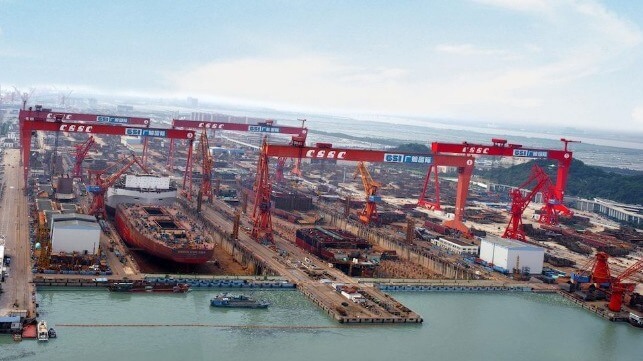US Unions File Trade Complaint Accusing China of Unfair Shipbuilding Policy

A wide-reaching coalition of American labor unions, supported by U.S. Senators, today filed a formal complaint against China targeting its shipbuilding industry and the policies of the Chinese government in steel and other sectors that have supported the growth of the industry. In addition to blaming China for the decades-long decline in the American shipbuilding industry, the complaint also reaches into everything from China’s port development around the world, to its logistics network, and the logistics software LOGINK, calling for fees for Chinese-built ships and a U.S. Shipbuilding Revitalization Fund.
The 137-page complaint along with hundreds of supporting documents, was filed today under Section 302 of the U.S. Trade Act of 1974. The Act allows the United States to respond to “unreasonable or discriminatory foreign government practices that burden or restrict U.S. commerce.” The effort is being led by the union for U.S. steelworkers (UWS), along with machinists (IAM), shipbuilders (IBB), electrical workers (IBEW), and the AFL-CIO’s Maritime Trade Department.
The groups are accusing China of “unreasonable and discriminatory acts, policies, and practices” to dominate the maritime, logistics, and shipbuilding sectors. They highlight the plans of China’s Central Government to build up the shipbuilding industry over the past 20 years saying they have taken actions to seize market share, suppress prices, and create a worldwide network of ports and logistics infrastructure.
The petition shows that China has “funneled hundreds of billions of dollars and adopted numerous supporting policies,” to support shipbuilding and the maritime sector. They said the actions include loans from state-owned banks, equity infusions, provisioning steel at below-market prices, tax preferences, and tens of billions of dollars in loans to support construction of thousands of vessels in China for foreign export. They also highlight that China has become a leader in ship financing and leasing.
Among the practices the petition calls unfair are mandates that Chinese companies must purchase and use Chinese-built companies. They also said the government has directed mergers and disapproved alliances with foreign companies.
The unions cite the decline of the U.S. shipbuilding industry from its post-World War II peak to its current position as the 19th in global rankings. They also cite that the U.S. has fewer than 80 commercial ships in international service while the Maritime Security Program is now using ships built in China.
Under U.S. law, the formal complaint goes to the U.S. Trade Representative, Ambassador Katherine Tai. She has 45 days to determine whether to initiate an investigation. Tai issued a statement acknowledging receipt of the complaint, saying, “I look forward to reviewing this petition in detail.”
She commented in a written statement, “We have seen the PRC create dependencies and vulnerabilities in multiple sectors, like steel, aluminum, solar, batteries, and critical minerals, harming American workers and businesses and creating real risks for our supply chains.”
The unions point out that a single commercial ship can require approximately 13,000 tons of structural steel, 60,000 gallons of paint, 130 miles of electrical cable, and many other products made by their members. In the petition, they call for actions from the Biden administration including a port fee on Chinese-built ships that dock in the U.S. as well as a fund to help the U.S. shipbuilding industry. The port fee is proposed recognizing that most Chinese-built ships used in international commerce are never imported into the U.S. in the sense of being owned by U.S. companies.

that matters most
Get the latest maritime news delivered to your inbox daily.
Senators Tammy Baldwin of Wisconsin and Bob Casey of Pennsylvania joined with the unions. According to their statement, China now has the capability to build over 1,000 ocean-going vessels each year while the U.S. produces fewer than 10.
There is no recognition in the complaint that U.S. shipbuilding has been in decline far longer than China was a competitor. They do not address the cost and supply issues nor acknowledge the requirement to build American if the vessel will be in the U.S. coastal trade.
